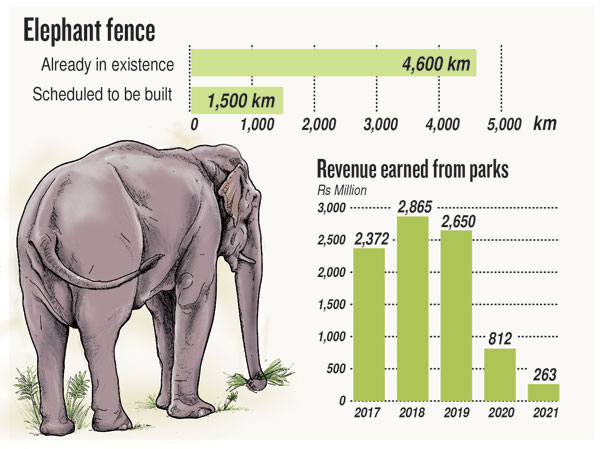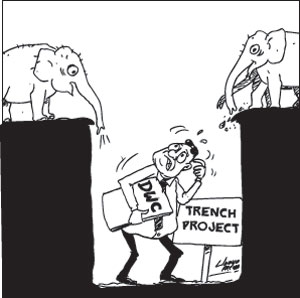News
Dig the trench and take the soil: Cash-strapped Wildlife Ministry in trunk call to businessmen
A cash-strapped Wildlife Protection State Ministry is calling on volunteers and businessmen to join its project to dig trenches that will prevent elephants from entering villages, Wildlife Protection State Minister Wimalaweera Dissanayake revealed this week.
Addressing the committee stage debate on the 2022 budget under the Wildlife Ministry head, he said that due to the pandemic-related lockdowns and a sharp fall in the number of visitors to wildlife parks, the Wildlife Conservation Department had experienced a revenue drop. This, together with employees not turning up at full strength, had affected the department’s activities.

“Tourists were the main source of the department’s revenue, but with the pandemic, their numbers have dwindled. The revenue collected in 2019 from wildlife parks was Rs. 2,650 million, but in 2020, it dropped to Rs. 812 million. So far this year, the department has earned only about Rs. 263 million,” the state minister revealed.
Mr. Dissanayake’s ministry is in charge of implementing measures required to minimise the human-elephant conflict. They include erecting electric fences and digging trenches. But the state minister said there was not enough money to dig trenches and, therefore the department had to come up with a solution to get the job done without paying for the labour.
This was why the department allowed volunteers and soil businessmen to dig the trenches and take the soil.
“We dig the elephant trenches without state funding. As a result, we were able to save some money and sent it back to the treasury,” he said.
The state minister said electric fences alone would not solve the human-elephant conflict because often, the elephants took the fences down. Therefore, the department was now using both fences and trenches, and deploying the Civil Defence Force (CDF) personnel to maintain them, he said.
“The department has built 4,600km of fences and trained 4,500 CDF personnel to maintain them. A project to build 1,500km of fences will begin on December 16, covering areas in Ampara, Anurdahapura and Hambantota,” he said, adding that 5,000 more CDF personnel would be trained to maintain the network of fences.
Responding to the state minister, Field Marshal Sarath Fonseka, who held the wildlife portfolio during the previous government, said erecting fences was a faster process than digging trenches, though both cost the same. He called on the state minister to award the fence project to a contractor so that the job could be done expeditiously.
The opposition parliamentarian also said that although the State Minister was showing more interest in digging trenches than erecting fences, the ministry had only dug 2.5 km of trenches in two years.
 Insisting that fencing was a better solution, the Field Marshal urged the state minister to look into the elephants’ needs such as food and water within reserves to minimise the human-elephant conflict.
Insisting that fencing was a better solution, the Field Marshal urged the state minister to look into the elephants’ needs such as food and water within reserves to minimise the human-elephant conflict.
Mr Fonseka said the task before the state ministry was to build another 2000km of fences and properly maintain the 4000km of fences that had already been built.
“While I was the Wildlife Minister, we estimated that Rs 6 billion was needed to complete the fencing project, but with the current economic crisis, the prices of steel, wire and electric equipment have increased. Therefore, the project may cost more than Rs 10 billion,” he said.
He also urged the Government to provide more facilities to CDF personnel deployed to maintain the fences.
The best way to say that you found the home of your dreams is by finding it on Hitad.lk. We have listings for apartments for sale or rent in Sri Lanka, no matter what locale you're looking for! Whether you live in Colombo, Galle, Kandy, Matara, Jaffna and more - we've got them all!

